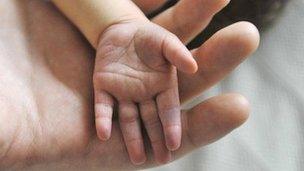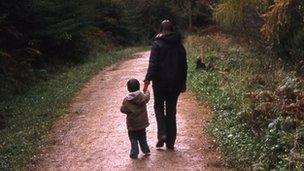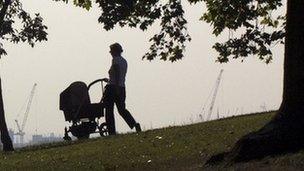Facing a child benefits dilemma
- Published

The value of child benefit is just over £20 a week for the first child
The concept of child benefit being paid to everyone is set to end in January 2013.
Today we have a very simple and universal system based upon the principle laid out by the architect of the welfare state William Beveridge.
In 1942, Beveridge recognised that women of whatever social class had little or no income of their own when they were bringing up children. He considered it an absolute necessity that they should have a source of funds to call their own.
It is for this reason that he created child benefit, which would almost always go directly to the mother. Even today it continues to largely go to the mother.
Chancellor George Osborne, when announcing its abolition for higher rate taxpayers in October 2010, missed the bigger picture of what it is worth to the mother. It actually amounts to quite a lot of untaxed income.
Child benefit totals £20.30 a week for the first child, and then £13.40 for each subsequent child.
There is no limit to the number of children that can be claimed for.
So, for a family with two children, the mother would receive £33.70 per week or £1,752.40 per year.
The equivalent in terms of earnings, taking income tax into account, would make it worth £2,190.50 for a basic rate taxpayer, and £2,920.67 for a higher rate taxpayer.
One can see it is worth something to the mother and it usually goes to helping bridge the gaps in the family budget.
'Peculiar'
In terms of the stark message from the chancellor in 2010, any family with one spouse earning and paying 40% tax would have the child allowance withdrawn.

People could make changes to their working hours to avoid losing the benefit
But it is also the most peculiar proposal for withdrawing it.
The spouse or partner who pays higher rate tax would have their tax code adjusted. This is how their income would be reduced by the amount of the child benefit.
This is a very strange way to deal with a change from the universal benefit proposed and implemented by Beveridge.
In addition, it drives a coach and horses through the idea of couples being subject to separate taxation.
As an engineering feature, of any tax, it cannot be fair or even easily justifiable, in my opinion, that the person receiving the benefit is not affected for the most part.
The consequences fall on the partner who is the 40% taxpayer and might never see the child benefit payment.
Savings
Then, there is the "cliff edge" situation.
Using the income tax bands in the current tax year, you can earn £42,475 and you will receive the full child benefit at the amounts I have mentioned above.
But as soon as you earn £42,476, and pay 40% tax on that first £1 over the threshold, you lose every penny of the child benefit.
It is quite a cliff edge and one which will affect ordinary families, in a time of austerity and rising mortgage costs, very hard indeed.
Withdrawing child benefit from such families will save the government £1bn from a total cost of £12bn.
This is just over an 8% cost saving.
One has to question whether such numbers actually stack up, as many families will do what they can to mitigate the loss of the benefit by salary sacrifice, increased pension payments, reducing working hours and having the other partner work more.
This would also be the same for the self-employed where their partner would be brought in to work in the business, perhaps undertaking administrative duties such as writing up the books and records, cleaning and maintenance work and so on.

The planned changes to child benefit are set to come into force in January
The government is now talking about mitigation of the cliff edge effect.
Clearly the easiest and most welcome approach by the chancellor, in the view of many members of the tax-paying and vote-wielding public who receive the benefit, I assume, is that the change does not go through.
Some 7.8 million families receive child benefit, of which 1.2 million would lose their entitlement under the proposals.
But this is not a static number. This is because:
Those who are initially unaffected may well be in future
People who do lose out at the start may not be affected in future as their income drops, due to layoffs or shorter working hours in the current volatile economy
Other options to mitigate the cliff edge effect could be brought in
These options might include keeping the entitlement universal, but only allowing a parent to claim until their child reaches an age lower than the current limit.
The Treasury will need to do the maths, but perhaps they could save the same amount by dropping the child age to, say, 11 years old.
This would tie in with the child going to secondary school but also, from my experience, with when children start to get more expensive.
'Household' income
Alternatively, but again it disregards separate taxation of individuals, they could adopt the same principle as tax credits of "household income".
That is the combined income of the two partners.
This approach could mitigate the cliff edge effect. It would also prevent the unfairness of the one-earner household losing their entire entitlement at £42,476 whereas the two-earner household can earn £84,000 collectively and keep the full entitlement.
The government could set a maximum household income after which the entitlement starts to taper off.
For example, one option would be an income limit of £60,000 for every family, above which for every £2 more earned, £1 of child benefit is lost.
I have to say such a system would be complex and susceptible to over and underpayments as well as fraud and manipulation, as has been the case with tax credits.
In short, I do not see that there is an easy way out of the proposal to withdraw the child benefit from 40% taxpayers.
My suggestion would be to withdraw the proposal and for the chancellor to say quite openly that that the original plan would cost almost as much as it would save - especially when trying to address the cliff edge issue.
The opinions expressed are those of the author and are not held by the BBC unless specifically stated. The material is for general information only and does not constitute investment, tax, legal or other form of advice. You should not rely on this information to make (or refrain from making) any decisions. Links to external sites are for information only and do not constitute endorsement. Always obtain independent, professional advice for your own particular situation.